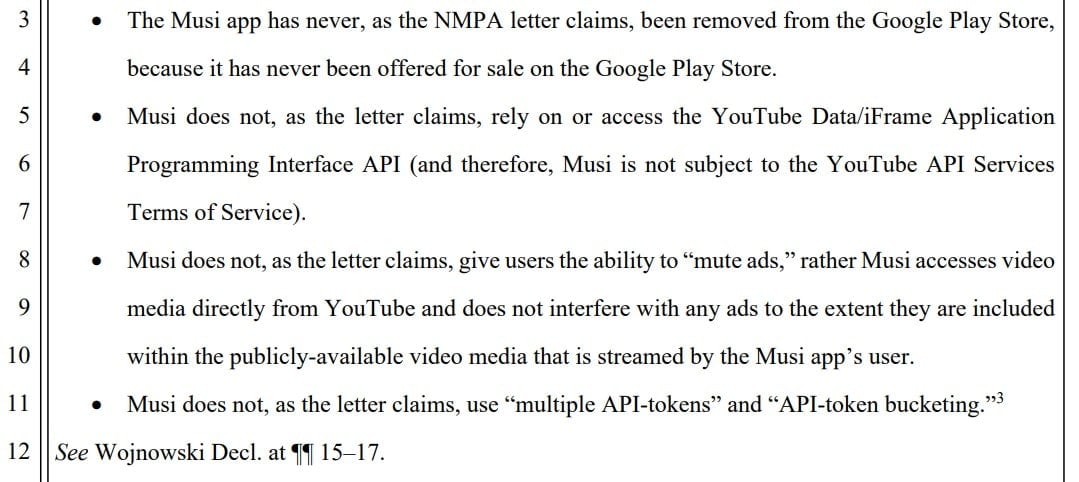Music streaming app Musi claims Apple removed its app from the App Store after "backroom conversations" with key music industry players. The app developer alleges this was an "unfair" and "tainted" removal process designed to put it out of business. Musi is seeking a preliminary injunction to reinstate its app while the legal battle plays out.
In October, Musi filed a lawsuit against Apple after the company removed the music streaming app from the App Store.
Filed at a California federal court, the Musi complaint states that the takedown was unjustified and accuses Apple of breach of contract, among other things.
Wasting no time, Musi requested a preliminary injunction to compel Apple to reinstate the music app. While existing users still have access to the software, it’s no longer available for new users to download which directly impacts revenue. If this continues, Musi will eventually be put out of business.
Apple Justifies ‘Removal’
Last month, a response was filed in court by Apple, opposing Musi’s request for a preliminary injunction. The company argues that the terms of the Apple Developer Program License Agreement (DLPA) allow the company to delist apps “at any time, with or without cause.”
While claiming neutrality in these disputes, Apple stated that multiple complaints led to its action, including legitimate concerns aired by YouTube and music industry rightsholders.
“Apple’s decision in this instance followed numerous, credible complaints alleging that the Musi app violates the legal rights of third parties,” Apple wrote to the court, mentioning complaints from various music industry parties.
Musi Sees a ‘Backchannel’ Removal Scheme
Last Friday, Musi filed a reply brief in support of its request for an injunction, countering Apple’s stance. According to the app developer, Apple isn’t as neutral as it would like the court to believe.

Unfair & Tainted
On the contrary, Apple allegedly engaged in private discussions with stakeholders including Google and this alleged ‘backchannel’ influenced the removal decision.
“Apple positions itself as exercising this power as a neutral party that does not favor one app developer over another, but Apple’s Opposition reveals that it used its power over the App Store as part of a larger backchannel scheme with music-industry conglomerates bent on Musi’s destruction,” Musi writes.
As an example, Musi notes that YouTube’s ‘five-word’ app store complaint was preceded by direct discussions between Apple and the music streaming platform. Musi was never involved in these discussions, and YouTube didn’t reply to Musi’s outreach after the complaint either.
Misinformation?
Apple cited numerous app disputes in its opposition brief, but Musi argues these were misrepresented to the court. For example, IFPI’s complaint expressly disavowed any claim under U.S. copyright law, Musi notes.
In addition, Apple references a 2023 complaint from Sony Music Entertainment (SME). However, that dispute didn’t come from Sony at all, but from IFPI. This was confirmed by the music company over email, as shown below.
“[W]hen Musi attempted to open a dialogue with SME, SME stated that it had no complaint, and that the complaint belonged to IFPI,” Musi writes.
A letter sent by the National Music Publishers Association (NMPA) to Apple further added to the ‘tainted backroom’ picture, as Musi highlights that it includes various false claims.

Alleged False Claims
All in all, Musi contends that Apple’s decision is based on a one-sided view. This includes numerous claimed inaccuracies, as well as “hit pieces” by the press, which were allegedly commissioned by the music industry.
“Those articles signify nothing other than a one-sided press push by the same players involved in the backroom discussions with Apple, seeking to conjure up an image of support for Musi’s removal,” Musi writes.
(Note TF: These supposed hit pieces include one of our previous articles, which detailed the music industry’s plans to put pressure on the app. For the record, this article was independently written and certainly not commissioned, directed or approved by anyone else.)
‘A Damaging Backroom Deal’
If copyright concerns were the primary motivator, Apple could have taken action against the YouTube app as well, Musi notes. After all, YouTube receives an astronomical number of copyright complaints and has been involved in various copyright lawsuits.
Musi was never sued, not even by IFPI, which previously considered taking legal action. Instead, Musi was removed after a five-word complaint from YouTube, without a real opportunity to defend itself.
This, Musi argues, puts the future of its business at risk. Musi is currently missing the typical inflow of over 886,000 new users a month. In addition, a future iOS update may render the app inoperable even for current users.
All in all, Musi believes that the removal decision was not the result of a neutral review process. Therefore, the app should be reinstated through a preliminary injunction while the legal challenge unfolds.
“Apple removed the app because a select few music industry conglomerates saw the Musi app as a threat and, using unique access to Apple, engaged in backroom conversations to ensure that the Musi app could no longer compete on the platform.
“Apple’s claim to unfettered discretion is only a quest for power to operate the App Store for the benefit of a few powerful stakeholders, and at the expense of small developers—exactly what happened here. Granting Musi’s motion avoids that outcome.
—
A copy of Musi’s reply in support for the preliminary injunction is available here (pdf)
Hope you enjoyed this news post.
Thank you for appreciating my time and effort posting news every day for many years.
2023: Over 5,800 news posts | 2024 (till end of November): 5,298 news posts
RIP Matrix | Farewell my friend ![]()



3175x175(CURRENT).thumb.jpg.b05acc060982b36f5891ba728e6d953c.jpg)
Recommended Comments
There are no comments to display.
Join the conversation
You can post now and register later. If you have an account, sign in now to post with your account.
Note: Your post will require moderator approval before it will be visible.